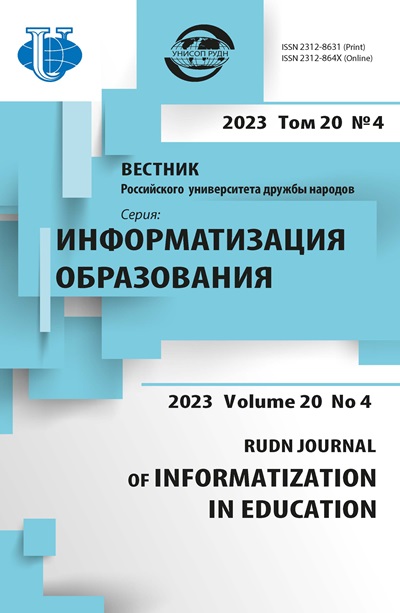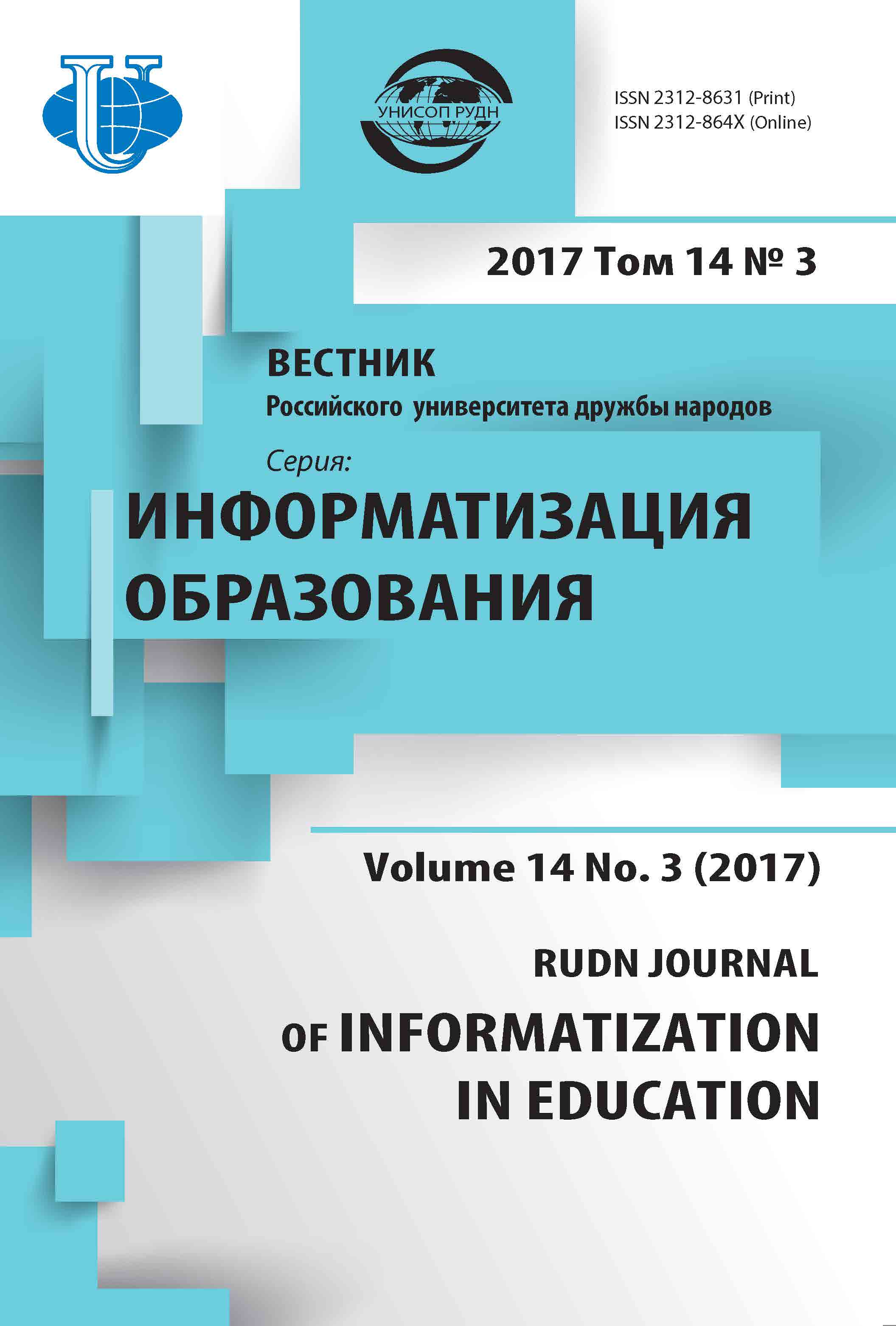SPECIFIC OF USING MASSIVE OPEN EDUCATIONAL ELECTRONIC COURSES IN RUSSIAN AND FOREIGN UNIVERSITIES
- Authors: Grinshkun VV1, Krasnova GA2
-
Affiliations:
- Moscow city pedagogical university
- Russian Academy of National Economy and Public Administration under the President of Russian Federation
- Issue: Vol 14, No 3 (2017)
- Pages: 255-266
- Section: DIDUCTIC ASPECTS OF EDUCATION INFORMATIZATION
- URL: https://journals.rudn.ru/informatization-education/article/view/16924
- DOI: https://doi.org/10.22363/2312-8631-2017-14-3-255-266
Cite item
Full Text
Abstract
Characteristic feature of informatization of education for several last years is emergence and fast distribution of MOOCs - mass open online courses. Specificity of the Russian education system can’t but affect features of development and deployment of such courses taking into account realities of work of domestic universities. For expansion of opportunities of influence of MOOCs on increase in learning efficiency of students in higher education institutions carrying out the analysis of experience of use of such means of informatization of education, both in Russia, and beyond her limits is expedient. The present article contains transfer and the description of various aspects of emergence and distribution of MOOCs in the world, in general, and in our country, in particular. The short characteristic of possible approaches to development and deployment of MOOCs and their component in domestic system of the higher education is given, examples of the Russian and foreign platforms by means of which such courses become public are given. It is emphasized that universal experience of informatization of the higher education on the basis of use of MOOCs without the corresponding adaptation can’t be applied to training of students in the Russian higher education institutions.
About the authors
V V Grinshkun
Moscow city pedagogical university
Author for correspondence.
Email: vadim@grinshkun.ru
Grinshkun Vadim Valeryevich, doctor of pedagogical sciences, full professor, head of the department of informatization of formation of the Moscow city pedagogical university.
Sheremetyevskaya str., 29, Moscow, Russia, 127521G A Krasnova
Russian Academy of National Economy and Public Administration under the President of Russian Federation
Email: director_ido@mail.ru
Krasnova Gulnara Amangeldinovna, Doctor of Philosophy, full professor, the leading researcher of the Center of economy of continuous formation of the Russian academy of national economy and public service at the Russian President.
Prospekt Vernadskogo, 82, Moscow, Russia, 119571References
- Andreev A.A. Rossijskie otkrytye obrazovatel’nye resursy i massovye otkrytye distancionnye kursy [The Russian open educational resources and mass open remote courses]. Vysshee obrazovanie v Rossii [Higher education in Russia]. 2014. No. 6. Pp. 150—155.
- Atanasjan S.L., Grigor’ev S.G., Grinshkun V.V. Proektirovanie struktury informacionnoj obrazovatel’noj sredy pedagogicheskogo vuza [Design of structure of the information educational environment of pedagogical higher education institution]. Informatika i obrazovanie [Informatics and education]. 2009. No. 3. Pp. 90—96.
- Vedushhie rossijskie universitety sozdali nekommercheskuju organizaciju dlja sovmestnogo razvitija onlajn-obuchenija [The leading Russian universities have created non-profit organization for joint development of online training]. URL: http://minobrnauki.rf/novosti/5369 (дата обращения: 25.03.2017).
- Grinshkun V.V. Informatizacija kak znachimyj komponent sovershenstvovanija sistemy podgotovki pedagogov [Informatization as significant component of improvement of system of training of teachers]. Vestnik Moskovskogo gorodskogo pedagogicheskogo universiteta. Serija «Informatika i informatizacija obrazovanija» [Bulletin of the Moscow city pedagogical university. “Informatics and Informatization of Education” series]. 2014. No. 1 (27). Pp. 15—21.
- Grinshkun V.V., Krasnova G.A. Novye industrial’nye i informacionnye revoljucii i ih vlijanie na sistemu obrazovanija [New industrial and information revolutions and their influence on an education system]. Vestnik Moskovskogo gorodskogo pedagogicheskogo universiteta. Serija «Informatika i informatizacija obrazovanija» [Bulletin of the Moscow city pedagogical university. “Informatics and Informatization of Education” series]. 2017. No. 1 (39). Pp. 45—52.
- Makeeva A. Obrazovanie uhodit v set’ [Education goes to network]. Kommersant [Businessman]. 12.01.2017. No. 4.
- Na Coursera pojavilis’ russkojazychnye kursy [On Coursera Russian-speaking courses have appeared]. URL: http://lenta.ru/news/2013/10/24/coursera/ (дата обращения: 25.03.2017).
- O pasporte prioritetnogo proekta «Jeksport obrazovanija», o hode realizacii prioritetnogo proekta «Jeksport produkcii APK» [About the passport of the priority project “Education Export”, about the course of implementation of the priority project “Export of Production of Agrarian and Industrial Complex”]. Zasedanie prezidiuma Soveta pri Prezidente Rossijskoj Federacii po strategicheskomu razvitiju i prioritetnym proektam ot 30 maja 2017 g. [A meeting of presidium of Council at the President of the Russian Federation for strategic development and priority projects of May 30, 2017]. URL: http://government.ru/news/27862/ (дата обращения: 25.03.2017).
- Parlamentskie slushanija «Normativnoe obespechenie realizacii obrazovatel’nyh programm s primeneniem jelektronnogo obuchenija i distancionnyh obrazovatel’nyh tehnologij» [Parliamentary hearings “Standard ensuring implementation of educational programs with application of electronic training and remote educational technologies”]. Informacionnyj material Ministerstva obrazovanija i nauki Rossijskoj Federacii. Moskva. Gosudarstvennaja Duma Rossijskoj Federacii, Komitet po obrazovaniju. 19 maja 2014 g. [Information material of the Ministry of Education and Science of the Russian Federation. Moscow. State Duma of the Russian Federation, Committee on Education. May 19, 2014].
- Juan’ L., Paujell S. MOOK i otkrytoe obrazovanie: znachenie dlja vysshego obrazovanija [L. Yuan, Powell S. MOOK and open education: value for the higher education]. URL: www.euroosvita.net/prog/data/attach/2888/moocs-and-open-education-1.doc (дата обращения: 25.03.2017).
- Harvard Business Review. Who’s Benefiting from MOOCs. 2015 [Harvard Business Review. Who’s Benefiting from MOOCs. 2015]. URL: https://hbr.org/2015/09/whos-benefiting-from-moocs-and-why (дата обращения: 25.03.2017).
- Gaebel M., Kupriyanova V., Morais R., Colucci E. E-learning in European Higher Education Institutions. European University Association [E-learning in European Higher Education Institutions. European University Association]. 2014. Pp. 55. (дата обращения: 25.03.2017).
- The Near Future of International Education. ICEF & Barton Carlyle. 2017. Pp. 71. URL: http://www.icef.com/beyondthehorizon/ (дата обращения: 25.03.2017).
- The NMC Horizon Report: 2015 Higher Education Edition. The New media consortium. 2015». URL: https://www.nmc.org/publication/nmc-horizon-report-2015-higher-education-edition/
















